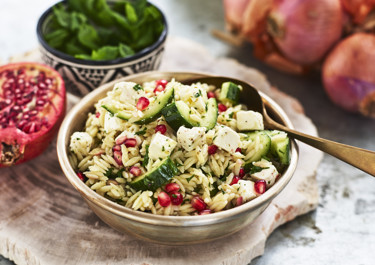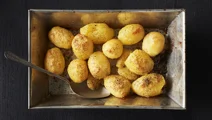&format=webp)
Turkish pasta salad

Instructions
Step 1
Step 2
Step 3
Step 4
Step 5
Questions about Turkish pasta salad
This deliciously fresh salad makes for a perfectly balanced meal. Read below to know more about the frequently asked questions.
Ingredients
|
Yellow onion
|
1 |
|---|---|
|
Garlic cloves
|
2 |
|
Butter
|
1 tbsp |
|
Olive oil
|
1 tbsp |
|
Cucumber
|
1 |
|
Chopped fresh parsley leaves
|
25 g |
|
Garlic and parsley white cheese cubes
|
200 g |
|
The seeds of half a pomegranates
|
|
|
Salt to taste
|
|
|
Black pepper to taste
|
An all-time favourite in Turkish cuisine
Makaronya, as pasta was first named in Turkey, arrived on the Ottoman culinary scene in the late 1700s. Originally imported from Italy, it didn’t take long for the ingredient to become hugely popular and, by the 1830s, the country started to produce its own in the first makarna factory in Üsküdar, Istanbul. This recipe is one of Turkey’s favourites and you will find colourful pasta salads, infused with fresh ingredients and simple dressings on most restaurant menus and home kitchen tables.
Try these different dressings
Instead of a full-on dressing, our recipe calls for a simple drizzle of olive oil as a finishing touch that brings the salad together without overpowering its flavours. Replicating some of the salad’s ingredients in a dressing is also a good way to infuse extra flavour and a garlic, lemon, mint, parsley, and olive oil combination is one of our favourites.
Add this to your Turkish pasta salad
Adding a leafy green like baby spinach will bring a subtle new flavour to the salad. Capsicum, in its wide array of bright colours, is also a common ingredient that can be found in many Turkish recipes and their sweet, slightly bitter taste pairs especially well with this salad’s milder flavours.










